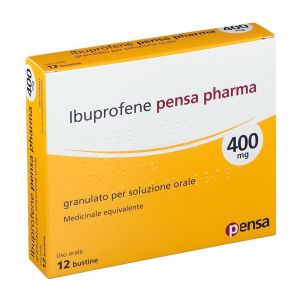Ship in Europe, Find out rates!
Ibuprofen Pensa Pharma 400 mg 12 Sachets

- box Delivery in Italy in 24/48 and free returns
- star3.000+ positive reviews
- dropboxOver 60,000 products in the catalog
Ibuprofen-based sachets.
Therapeutic indications
Ibuprofen Pensa Pharma is used in the treatment of pain of various origins and nature (headache, toothache, neuralgia, osteo-joint and muscle pain, menstrual pain). and as an adjuvant in the symptomatic treatment of fever and flu.
Dosage and Posology
The drug should be taken according to the following doses and methods:
- Adults and children over 12 years: 1 sachet 2-3 times a day. Do not exceed the dose of 3 sachets per day.
Take the product preferably on a full stomach. The dose should be dissolved in a glass of water, stirring with a teaspoon until dissolved and taken immediately after the preparation of the solution. Do not exceed the recommended dose; in particular elderly patients should follow the minimum dosages indicated above. In adolescents (age range: ≥12 years to <18 years): If this medicinal product requires use in adolescents for more than 3 days or if symptoms worsen a doctor should be consulted. Undesirable effects can be minimized by using the lowest effective dose for the shortest possible treatment duration needed to control symptoms.
Overdose
In case of overdose, gastric lavage, correction of blood electrolytes is indicated. There is no specific antidote to ibuprofen.
Contraindications
- Age less than 12 years old
- Pregnancy and breastfeeding
- Hypersensitivity to the active substance, to other antirheumatics (acetylsalicylic acid, etc.) or to any of the excipients
- Patients who have experienced bronchospasm, asthma, rhinitis or urticaria following the use of acetylsalicylic acid or other non-steroidal anti-inflammatory drugs
- Active or severe gastroduodenal ulcer or other gastropathies
- History of gastrointestinal bleeding or perforation related to previous active treatments or history of recurrent peptic ulcer / haemorrhage (two or more distinct episodes of proven ulceration or bleeding)
- Severe hepatic or renal insufficiency. • Severe heart failure (NYHA class IV)
- The sachets of granules for oral solution contain aspartame; they are therefore contraindicated in subjects suffering from phenylketonuria
Side effects
- Skin and subcutaneous tissue disorders
- Sometimes allergic skin rashes (erythema, itching, urticaria) can occur. Bullous reactions including Stevens-Johnson Syndrome and Toxic Epidermal Necrolysis (very rarely).
- Gastrointestinal disorders
- The most commonly observed adverse events are gastrointestinal in nature. Peptic ulcers, gastrointestinal perforation or bleeding, sometimes fatal, may occur, particularly in the elderly. After administration of Ibuprofen Pensa Pharma the following have been reported: feeling of stomach weight, nausea, vomiting, diarrhea, flatulence, constipation, dyspepsia, abdominal pain, melaena, haematemesis, ulcerative stomatitis, exacerbation of colitis and Crohn's disease. Gastritis was observed less frequently.
- Cardiac pathologies
- Edema, hypertension and heart failure have been reported in association with NSAID treatment. Clinical studies suggest that the use of ibuprofen, especially at high doses (2400 mg / day), may be associated with a modest increased risk of arterial thrombotic events (e.g. myocardial infarction or stroke). These phenomena generally tend to regress with the suspension of treatment.
Pregnancy and breastfeeding
The medicine is contraindicated in case of confirmed and presumed pregnancy, and during breastfeeding.
Inhibition of prostaglandin synthesis can adversely affect pregnancy and / or embryo / fetal development. Results of epidemiological studies suggest an increased risk of miscarriage and cardiac malformation and gastroschisis after use of a prostaglandin synthesis inhibitor in early pregnancy. The absolute risk of cardiac malformations increased from less than 1% to approximately 1.5%. The risk was considered to increase with dose and duration of therapy. In animals, administration of prostaglandin synthesis inhibitors has been shown to cause increased pre- and post-implantation loss and embryo-fetal mortality. In addition, an increased incidence of various malformations, including cardiovascular, has been reported in animals given prostaglandin synthesis inhibitors during the organogenetic period. During the first and second trimester of pregnancy, Ibuprofen Pensa Pharma should not be administered except when strictly necessary. If Ibuprofen Pensa Pharma is used by a woman attempting to conceive, or during the first and second trimester of pregnancy, the dose and duration of treatment should be kept as low as possible. During the third trimester of pregnancy, all prostaglandin synthesis inhibitors can expose
- the fetus to:
- cardiopulmonary toxicity (with premature closure of the arterial duct and pulmonary hypertension);
- renal dysfunction, which can progress to renal failure with oligo-hydroamnios;
- the mother and the newborn, at the end of pregnancy, to:
- possible prolongation of bleeding time, and antiplatelet effect which may occur even at very low doses;
- inhibition of uterine contractions resulting in delayed or prolonged labor.
Special warnings
In patients with asthma, ibuprofen should be used with caution, after consulting your doctor. The use of Ibuprofen Pensa Pharma, as with any prostaglandin synthesis and cyclooxygenase inhibitor drug, is not recommended in women intending to become pregnant. Ibuprofen Pensa Pharma should be discontinued in women who have fertility problems or who are undergoing fertility investigations. The use of Ibuprofen Pensa Pharma should be avoided in conjunction with NSAIDs, including selective COX-2 inhibitors. Undesirable effects can be minimized by using the lowest effective dose for the shortest possible duration of treatment needed to control symptoms (see sections below on gastrointestinal and cardiovascular risks)
Cardiovascular and cerebrovascular effects: Clinical studies suggest that the use of ibuprofen, especially at high doses (2400 mg / day), may be associated with a modest increased risk of arterial thrombotic events (e.g. myocardial infarction or stroke). In general, epidemiological studies do not suggest that low doses of ibuprofen (e.g. ≤ 1200 mg / day) are associated with an increased risk of arterial thrombotic events. Patients with uncontrolled hypertension, congestive heart failure (NYHA class II-III), established ischemic heart disease, peripheral arterial disease and / or cerebrovascular disease should only be treated with ibuprofen after careful consideration and high doses (2400 mg / day) should be avoided. ).
Careful consideration should also be exercised before initiating long-term treatment patients with risk factors for cardiovascular events (e.g. hypertension, hyperlipidemia, diabetes mellitus, cigarette smoking), especially if high doses (2400 mg / die) of ibuprofen. • Elderly: Elderly patients have an increased frequency of adverse reactions to NSAIDs, especially gastrointestinal bleeding and perforation, which can be fatal.
Gastrointestinal bleeding, ulceration and perforation: Gastrointestinal bleeding, ulceration and perforation, which can be fatal, have been reported during treatment with all NSAIDs, at any time, with or without warning symptoms or a previous history of serious gastrointestinal events. • In the elderly and in patients with a history of ulcer, particularly if complicated with haemorrhage or perforation, the risk of gastrointestinal bleeding, ulceration or perforation is higher with increased doses of NSAIDs. These patients should start treatment with the lowest available dose. Concomitant use of protective agents (misoprostol or proton pump inhibitors) should be considered for these patients and also for patients taking low dose aspirin acetylsalicylic acid or other drugs that may increase the risk of gastrointestinal events.
Patients with a history of gastrointestinal toxicity, particularly the elderly, should report any unusual gastrointestinal symptoms (especially gastrointestinal bleeding) particularly in the initial stages of treatment.Check carefully for patients taking concomitant medications that may increase the risk of ulceration or bleeding, such as corticosteroids oral, anticoagulants such as warfarin, selective serotonin reuptake inhibitors or antiplatelet agents such as acetylsalicylic acid.
When gastrointestinal bleeding or ulceration occurs in patients taking Ibuprofen Pensa Pharma the treatment should be discontinued. • NSAIDs should be administered with caution to patients with a history of gastrointestinal disease (ulcerative colitis, Crohn's disease) as these conditions can be exacerbated.
Caution is required before starting treatment in patients with a history of hypertension and / or heart failure as fluid retention, hypertension and edema have been reported in association with treatment with NSAIDs. Serious skin reactions, some of them fatal, including exfoliative dermatitis, Stevens-Johnson syndrome and toxic epidermal necrolysis, have been reported very rarely in association with the use of NSAIDs (see section 4.8). In the early stages of therapy, patients appear to be at higher risk: the onset of the reaction occurs in most cases within the first month of treatment. Ibuprofen Pensa Pharma should be discontinued at the first appearance of skin rash, mucosal lesions or any other signs of hypersensitivity. • Risk of impaired renal function in dehydrated children and adolescents.
Ibuprofen Pensa Pharma 400 mg granules for oral solution contains: - sucrose: patients with rare hereditary fructose disease, glucose and galactose malabsorption and sucrase-isomaltase insufficiency should not take this medicine. - aspartame, a source of phenylalanine. Therefore it is contraindicated in subjects with phenylketonuria. - 45 mg of sodium (1.9 mmol) per sachet. This should be taken into account by patients with impaired renal function or on a low-sodium diet. - 90 mg of potassium (2.3 mmol) per sachet. To be taken into consideration in people with reduced kidney function or who follow a hypokalaxic diet.
Expiry and retention
Check the expiration date indicated on the package. The expiry date indicated on the package refers to the product in intact packaging, correctly stored. No special storage precautions.
Warning : do not use the medicine after the expiry date indicated on the package.
Composition
One tablet of Ibuprofen Pensa Pharma contains:
Active principle
Ibuprofen sodium salt dihydrate 512 mg (corresponding to 400 mg of Ibuprofen).
Excipients
Sucrose, potassium bicarbonate, orange flavor, acesulfame potassium, aspartame (E951).

